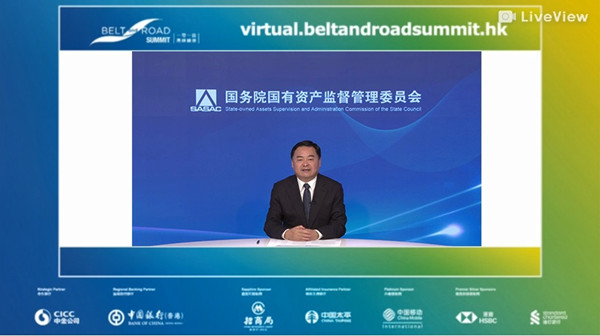
Hao Peng, Chairman of the State-owned Assets Supervision and Administration Commission of the State Council (SASAC), virtually attends and addresses the opening ceremony of the sixth Belt and Road Summit in Hong Kong on Sept 1. [Photo/sasac.gov.cn]
Hao Peng, Chairman of the State-owned Assets Supervision and Administration Commission of the State Council (SASAC), virtually attended and addressed the opening ceremony of the sixth Belt and Road Summit in Hong Kong on Sept 1.
Hao said that SASAC will firmly implement the spirit of key instructions made by President Xi Jinping, guide central state-owned enterprises (SOEs) to stick to the principles of opening, cooperation and mutual benefits, and align the high-quality joint building of the Belt and Road with the fostering of a new development paradigm, the deepening of the construction of the Guangdong-Hong Kong-Macao Greater Bay Area, and the implementation of the 14th Five-Year Plan. SASAC is ready to join hands with Hong Kong and other parties to achieve more tangible results in regional and international cooperation and inject new vitality into the economic and social development of Hong Kong and the recovery of the global economy.
Hao said that President Xi had reiterated to the international community on many occasions China's stances and propositions on the high-quality joint building of the Belt and Road, pointing the direction of development and offering fundamental guidance for central SOEs to deepen international economic and trade cooperation and advance the joint efforts to build the Belt and Road. Central SOEs, focusing on the joint building of the Belt and Road, have taken persistent efforts to improve their international operation over the past few years. Since the outbreak of the COVID-19 , they have coordinated epidemic prevention and control measures with normal business operations in their overseas branches, ensured the smooth construction of a number of major projects, and delivered confidence and strength to the international community.
Hao noted that Hong Kong has become an important partner and bridge for central SOEs to participate in the joint efforts to build the Belt and Road and that the Belt and Road Summit in Hong Kong has created a major platform and numerous development opportunities for various sides to deepen their cooperation. SASAC and central SOEs will unswervingly implement the "One country, Two systems" principle, support the Hong Kong Special Administrative Region government in administration according to law. SASAC will also encourage more central SOEs to invest and do business in Hong Kong to better promote lasting prosperity and stability in the region. SASAC and central SOE stand ready to work with relevant sides to deepen international economic and trade cooperation, strengthen inter-connectivity in the sectors of infrastructure, transport and communications, and enlarge the space of economic growth. They will work together to advance cooperation in technological innovation, promote innovative development in the fields of digital economy, artificial intelligence, bio-medicine and modern energy, support the construction of the international innovation and technology center in Hong Kong, and consolidate the new engines of economic growth. They will jointly deepen cooperation on professional service, leverage the resources of Hong Kong in financing, laws, accounting and auditing, and enhance the level of regional and international trade cooperation. They will also strengthen cooperation on green economy, adjust and improve industrial and energy structure, facilitate cooperation on green infrastructure construction, green energy and green financing, and constantly contribute to high-quality development.
Under the theme of Driving Growth through Fostering Regional and International Trade, the summit was virtually attended by government representatives of a number of countries, heads of international organizations, and senior executives of Chinese and foreign enterprises.
A total of 41 Chinese central SOEs attended the summit virtually.
(Executive editor: Hao Wen)